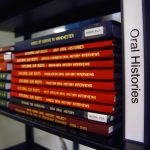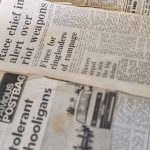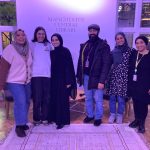Our archives tell the stories of many strong women. As you may have seen from our posts on Twitter and Instagram (@aiucentre), this year we’ve decided to shine a light on some of these amazing women, their lives, and their achievements. There are many more important women we could share the stories of – this is just a selection!
Below, you can see them all in one place. Enjoy, and please let us know what you think!
Elouise Edwards – A symbol of resistance
Elouise Edwards was born in Guyana, South America, in 1932 – the youngest of 10 children. She moved to the UK with her son in 1961, to follow her husband Beresford who had a box-making job in Levenshulme. The family lived in Moss Side, Manchester.

Shortly after settling, Elouise and Beresford soon became active in the struggle against inequality and racism that existed at that time. They challenged racist attitudes and campaigned for the needs of people from overseas. This developed into a lifelong fight for equality. In 1964, Elouise Edwards, along with several others involved in the struggle, founded the West Indian Organisations Coordinating Committee (WIOCC), which is still active today.
In 1975 Elouise began working at the Family Advice Centre in Moss Side as a Neighbourhood Social Worker, and later a Community Development Officer. Working at the Family Advice Centre not only meant she could offer care and solace to many people, but also acted as a platform from which she could kick-start the African Caribbean Mental Health Project which supported young people’s needs. Elouise Edwards was instrumental in celebrating Black culture, and developing vital community resources.
In 1988 she embarked on the Roots Family History Project, which archived people’s lived experiences of migration and how they settled in the UK. In 2012, along with hundreds of photographs, newspaper clippings, black newsletters and reports, Elouise donated these oral histories to the Ahmed Iqbal Ullah Race Relations Resource Centre.
The Elouise Edwards Collection can be found here: GB3228.5
Anwar Ditta – Anti-deportation activist
Anwar Ditta was born in 1953, in Birmingham, UK. After her parents separated in 1962, she was sent to live with family in Pakistan, where she married and had 3 children. In 1975, Anwar and her husband decided to return to the UK, leaving their children in Pakistan while they settled, found work and a home.

Unlike their mother, Anwar’s children had not been born in the UK, and therefore did not have British passports that gave them the freedom of movement. While Anwar was in Pakistan, three new laws (in 1962, 1968 and 1971) changed British immigration legislation, restricting migration from the Commonwealth. It was widely thought by those affected and those trying to challenge the laws that immigration officials often asked complex questions and complicated the process far more difficult and uncomfortable.
Anwar applied for her children to be reunited with her in 1976, and was interviewed in 1978, which was already a long wait to be without your children. In May 1979, the Home Office declared that they were ‘not satisfied that Kamran, Imran and Saima were related to Anwar Sultana Ditta and Shuja Ud Din as stated’. Their reasoning was that they believed there were two Anwar Ditta’s, one in Pakistan, and one in the UK.
And so launched the Anwar Ditta Defence Campaign, after Anwar attended a local anti-deportation campaign at Longsight Library, Manchester. Her news of her case quickly spread, and was supported by anti-racist activists, Asian Youth Movements in Manchester and Bradford, trade unions and political groups across the UK. Despite all this support, Anwar’s appeal to the Home Office was rejected on 30 July 1980.
In 1981, the campaign was covered on Granada TV’s World in Action current affairs programme, which involved a DNA test. Anwar had always offered to undertake this test. It was only after this was carried out and proved that Anwar’s children were hers, that the Home Office overturned the ruling and her children were brought to the UK.
Anwar is one of the most powerful women in our collection, and her case is an example of self-organisation and determination in the face of racism, deportation, and the splitting up of families.
Anwar first donated material documenting her struggle a few years ago, but the collection continues to grow. You can read about our latest catch-up with Anwar and her latest donation here. A catalogue will be available soon.
Kath Locke – Founder of Abasindi
Kath Locke was born in 1928 to an English mother and a Nigerian father. Her experience of racism from an early age in school and employment motivated her to campaign for social justice and racial and gender equality throughout her life.

Kath contributed significantly to increasing awareness of Black history in Manchester, including successfully campaigning for a plaque commemorating the 1945 Pan-African Congress to be placed on Chorlton Town Hall, All Saints.
In 1980, along with Elouise Edwards, Kath founded the Abasindi Cooperative in Manchester, an autonomous and self-determining women’s organisation that was established to benefit the Black women in the community. It was named after a Zulu word for ‘survivors’. The cooperative was run entirely by volunteers and was a place to meet socially, support each other, and do traditional crafts such as hair braiding and making jewellery.
After her death in 1992, The Kath Locke Centre was founded. The centre offers health and wellbeing services for communities around Moss Side and Hulme.
You can read Kath Locke’s oral history in our library.
Louise Da Cocodia – Assistant Superintendent of District Nurses
Born in St. Catherine’s parish, Jamaica, Louise Da Cocodia was one of the many individuals invited to the UK to staff the new NHS. She arrived in 1955, qualifying as a Staff Qualified Nurse three years later. Her experiences of racism from colleagues and patients created a desire to combat discrimination and tackle race equality issues.

In 1966, Louise was appointed as Assistant Superintendent of District Nurses, the first Black senior nursing officer in Manchester.
During her 31 year career as a nurse, she served on many governing boards and committees, influencing policy and strategy at Manchester Health Authority, Voluntary Action Manchester, the Church of England, schools and universities. Louise also co-founded many community enterprise schemes; these worked to raise the education, housing and employment aspirations of Manchester’s inner-city residents.
In 1981, during the famous Moss Side riots, Louise helped transport victims to hospital. She later sat on the Hytner Inquiry panel that investigated the causes of the unrest.
The Ahmed Iqbal Ullah Race Relations Resource Centre is proud to house a large amount of material on Louise’s life and achievements. It can be found in the Roots Family History Project archive, including photographs and an oral history interview (GB3228.7).
Qaisra Shahraz – Founder of MACFEST
Qaisra Shahraz already knew she wanted to be a writer when she was 6 years old – and now she’s a prize-winning and critically acclaimed novelist and scriptwriter.

Born in Pakistan in 1958, Qaisra moved to the UK as a young child, where her father had found work. She has lived in Manchester since childhood and studied at both University of Manchester and Salford University to gain degrees in Literature and screenwriting for TV and radio.
Qaisra is the founder, curator and executive director of MACFEST, Muslim Arts and Culture Festival, which aims to bring Muslim and non-Muslim communities together, promoting social inclusion and overcoming barriers.
Ann Adeyemi – Anti-racist teacher
Ann was born in Manchester in 1951. Ann’s grandmother was white Irish and her grandfather Black Liberian, and they met in Salford in the early 1900s.

Ann’s maternal grandmother was Ellen Carey, an Irish Catholic who came to Manchester as a young child in the 1880s. We know from her oral history that Ann’s mother was a major influence on her, teaching her to cook, to sing Irish rebel songs and to be self-reliant. Ellen ran a Chandlers at Salford dock and would look out for the Black seamen who arrived in the city, and ‘help them find lodgings and look after them, make sure they didn’t spend all their money or get ripped off’. This is how she met Ann’s grandfather, a Liberian seaman, during the First World War.
You can read more about Ann’s family history by clicking here. Or indeed visit our library to read her oral history transcript yourself.
In her early life, Ann lived in Cheetham Hill and Ashton. Despite her talent in art and fashion design, Ann was told by her teachers that she wouldn’t make it as a fashion designer. Instead, she studied History and English in Liverpool, where she was active in ‘Liverpool Anti-Racist Community Arts’ group.
Ann qualified as a teacher, and taught History, English and Drama across Wigan, Oldham, Manchester, Newcastle and Bolton. She later worked in London on a joint Arts Council and CRE anti-racism project.
Ann donated her archive to the Ahmed Iqbal Ullah Race Relations Resource Centre in 2010. It holds material that spans from 1928-1990s. The catalogue can be see here with the following reference: GB3228.2
Dr Sylvia Sham – Inspirational leader
Born in Hong Kong, Dr Sylvia Sham travelled to the UK in 1987 to study childcare. She continued her studies for 10 years and earned a PhD in Education.

Sylvia became the CEO of Wai Yin Society in Manchester in 1998, and led its continuous development. Dr Sham contributed to many national, regional and local advisory groups. The Wai Yin Society was founded in 1988 and has been supporting, empowering and working in partnership with Chinese individuals and families ever since.
Sylvia also contributed to health and social care organisations for BME business issues, such as Manchester’s Black and Ethnic Minority Strategy Consultation Forum and Salford’s Black and Minority Ethnic Forum. She encouraged Chinese people living in Britain to take an interest in social and political issues affecting their lives.
Dr Sham’s oral history is available in our library.
Locita Brandy – Queen of Moss Side Carnival
As a young mother in Moss Side, Mrs Locita Brandy often spoke to other Caribbean families about what they missed from back home. They all agreed; ‘We all missed our carnival’.

Mrs Brandy moved to the UK in the 1950s from the island of Nevis in the Caribbean. Along with a small committee, she decided to organise a Moss Side carnival in Alexandra Park. The first carnival, which took place in 1970, consisted of 3 floats.
Since then, Manchester carnival has brought Caribbean culture to the forefront every year – and is the north west’s largest celebration of Caribbean music and carnival arts. The carnival is a vibrant celebration of music, dance, theatre and costume.
In 2003, Mrs Brandy became a Labour politician and an elected political councillor in Manchester City Council, Moss Side Ward.
A large amount of material on the organising of Manchester Carnival is available in our archive: (GB3228.10)
Yvonne Bakht – Textile entrepreneur
The photograph below shows Yvonne Bakht in front of one of the many homemade murals that decorated the walls of their family restaurant, The Everest. This photograph, along with handmade place-mats, menus and correspondence can be found in the Malik Bakht archive (GB3228.76)

Born in August of 1937, Yvonne Parker grew up near Blackpool. She attended Blackpool Technical College and the Royal College of Art, London. While pursuing her own career in textile design, she married Malik Bakht in 1959 and supported both his community work and business ventures.
During the family’s numerous stays in East Pakistan, Yvonne (using the name Rabaya Malik) helped to set up a design centre and became the first qualified, independent, female design consultant working in both East and West Pakistan.
The family returned to the UK in 1972 and Yvonne resumed her career and supported the family’s restaurant, The Everest. After Malik died, she moved to Coventry to help set up workshops promoting the practice of crafts originating with minority communities in Coventry.
In 1983 she returned to the North West and continued her work in the creative arts, education, writing and illustrating.
SuAndi – “Ordinary stories are the best stories.”
SuAndi was born in Hulme, Manchester, and is of British and Nigerian heritage.

At an early age, SuAndi didn’t intend on becoming a writer, and instead learnt dance, drama and elocution at a dancing school. She later trained as a teacher, delivering writing workshops in schools. Su Andi’s career as a writer took off in the mid-1980s, when she joined Manchester’s first Black women’s poetry collective, Blackscribe.
SuAndi is the freelance Cultural Director of Black Arts Alliance (BAA), an organisation that was set up in 1985 to combat the marginalisation of Black art in the UK by funders, art audiences, and politicians alike. The BAA then became a registered charity run by Black artists, managed by a board of trustees and a development group of active members.
SuAndi’s donation of books from the BAA was the foundation of the library that now exists at the Ahmed Iqbal Ullah Race Relations Resource Centre. You can see which books are original BAA donations by the stamps in the front!
Fereshteh Mozaffari – Creative arts pioneer
“Being a refugee is an experience not an identity. And the label has to stop at some point. You have to be treated like a human being.”

Fereshteh Mozaffari, founder of Sheba Arts, studied Politics and worked as a journalist for the state TV in her home country Iran. She moved to the UK in 2010 to do her PhD in International Relations, but her life was turned upside down due to her political views and Fereshteh found herself trapped in an uncertain situation, living in limbo for years.
While living in limbo for years, Fereshteh started writing her autobiography and found creative writing fascinating. She published plays and short stories in Farsi and English, and joined Manchester theatre projects to explore her creativity in a different medium. She has written and performed solo shows ever since and has directed a few pieces devised with refugee communities.
Through creative projects with different communities, Fereshteh identified a lack of cultural heritage among the second generation of UK-born immigrants. She created a project titled ‘Gardens of Babylon’ in collaboration with the Ahmed Iqbal Ullah Education Trust, funded by Heritage Lottery Fund, which worked to document oral histories of first-generation Kurdish and Iranian immigrants to allow second-generation immigrants reconnect with their heritage.
With training from the AIU Centre, the project was developed into a digital exhibition. It is available to the public on the ground floor of Central Library.
Zara Hakobyan – Oral history project founder
This portrait of Zara Hakobyan was taken as part of ARATTA, an Armenian heritage project of which Zara is initiator and leader.

Born in 1989 in Armenia, Zara now resides in Northwich. She holds an Gender Studies MA in Social Sciences and Anthropology from the University of Hull, and a BA in Philology from Yerevan State University. She has held positions as Research Fellow at the Global Slavery Index Project at the Wilberforce Institute, and Project Co-ordinator at Red Cross Youth Armenia.
ARATTA is a Heritage Lottery Funded project focusing on the preservation of the Armenian heritage in the North West. 15 people, aged from 22-66, recorded oral histories about their lived experiences. The project was celebrated with a food sharing event in Manchester’s Albert Square and a portrait exhibition, which ran at the city’s Central Library for six weeks.
The interviews and project material, including portraits, family photographs and letters now form part of the AIURRRC archives.

Thank you for reading and Happy International Women’s Day!




